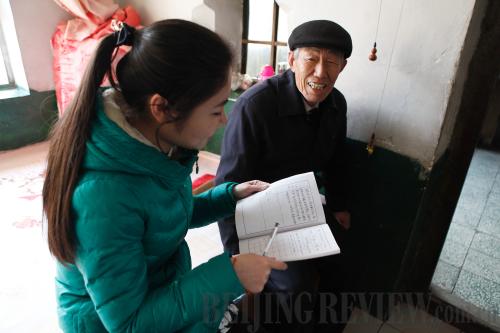|
 |
|
COLLECTING OPINIONS: Village assistant Zhang Si visits a villager in Zhouliang Village, Baodi District, Tianjin, on January 29 (WANG LEI) |
Zhang Si, a 24-year-old village assistant in Zhouliang Village, Baodi District in the northern port city of Tianjin, gathers opinions from villagers every day. She began her current job in September last year.
"The villagers tell me their opinions on village affairs, which will then be taken into consideration when important decisions are being made," Zhang told Beijing Review.
In every village of Zhouliang Township, there is a village assistant responsible for communicating the villagers' demands to the villagers' committees. In Baodi District, a consultative democratic system has been an important way in making decisions.
Villagers' voices
"In 2013, several villagers made a proposal to village representatives to transfer their land, so that they could be freed from farm work and find jobs in cities," said Li Guang'en, Party chief of Zhouliang Village. "The representatives raised the proposal to the Villagers' Committee and the village's CPC committee. The two committees then convened a meeting of villagers, over half of whom disagreed with their proposal," said Li.
China's rural land is leased from the state by farmers rather than owned outright. However, as the land was divided into small plots, productivity was low.
In order to increase production and improve efficiency, the country introduced a land transfer policy in 2004, which stipulated that farmers could rent their land to other farmers or companies while reserving their rights to contract the land.
"Land transfer is often difficult to carry out as most farmers regard land to be vital for their sustenance," Li explained.
"Village representatives and the elderly of the village—mostly Party members, retired teachers, veterans and government officials—explained to those who were reluctant to transfer their land how the transfer would increase their income, as they could be freed from farm work and find jobs in nearby cities which promised a stable monthly salary. In the meantime, they would be paid yearly rent fees for their land. Furthermore, the contract for transfer is renewed every three years. If farmers don't want to rent their land out again after three years, they can choose not to renew the contract," said Li.
Three meetings attended by members of the two committees, representatives and the elderly were held. They debated the proposal fiercely, weighing the advantages and disadvantages of the transfer, and consensus was finally reached to transfer the land at the third meeting. All the attendees agreed to the transfer and signed their names and pressed their fingerprints on an opinion poll sheet.
In Zhouliang Village, almost every decision is made by holding meetings to solicit opinions from villagers and cast a vote to make decisions.
"In the past, village representatives would attend a meeting to make decisions for villagers without asking their opinions. The decision would be met with discontent or even opposition from the villagers," Li told Beijing Review.
"Through democratic consultation, the public can have an opportunity to discuss and decide the major affairs of theirs. Everybody's opinion is taken into consideration," Li added.
In addition to important events such as land transfer, smaller affairs are also solved through such consultations in Baodi District.
For example, Dami Village planned to build a road through the village last October. However, some old trees belonging to some villagers lay where the road had been proposed, and so they had to be cut down. The villagers who owned the trees did not want their trees to be cut down.
The two committees of the village and village representatives held a joint meeting to discuss how to deal with the trees. After several meetings, they agreed to move the trees to the northwest part of the village. The villagers' interests were taken care of while the road was also built.
From January to April 2014, 804 consultation meetings were held in all the 765 villages of the district. Nearly 1,500 topics were discussed and passed, covering road construction, projects to improve residential surroundings and construction of cultural activity centers. As of last May, 179 proposals had been implemented. No complaints from the public were filed to the government concerning the agreed-on proposals.
"We would not make decisions without consulting the public," said Yin Qi, Secretary of the CPC Commission for Discipline Inspection of Baodi.
Baodi is not alone in carrying out democratic consultations. This form of democracy has been practised in many areas across China.
Prior to Baodi, Xinhe Township of Wenling in east China's Zhejiang Province started holding similar consultations in 1999. Today, this form of democracy has been used to make decisions in a multitude areas concerning public interest, from budget plans to local construction projects.
| 